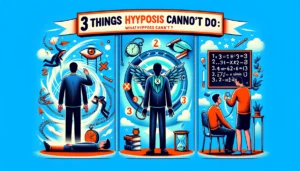I have spent countless hours researching and exploring various psychological techniques and therapies. One of the most intriguing and often misunderstood of these techniques is hypnosis treatments. While hypnosis has been shown to be effective in treating a wide range of conditions and helping people achieve their goals, there are also many misconceptions about what it can and cannot do. I will more into the topic of what hypnosis can’t do, focusing on three specific things that hypnosis cannot achieve, no matter how skilled the practitioner or eager the subject.
Understanding 3 Things Hypnosis Cannot Do

Before we explore the limitations of 3 Things Hypnosis Cannot Do, it’s essential to have a clear understanding of what hypnosis is and how it works.
What Hypnosis Can’t Do?

Hypnosis is a state of focused attention, heightened suggestibility, and relaxation. When a person is under hypnosis, they are not unconscious or asleep, but rather in a deeply relaxed and receptive state. This state allows the hypnotist to communicate directly with the subject’s subconscious mind, bypassing the critical and analytical aspects of the conscious mind.
| Key Characteristics of Hypnosis | Description |
|---|---|
| Focused Attention | The subject’s attention is highly focused on the hypnotist’s voice and suggestions |
| Heightened Suggestibility | The subject is more open and receptive to suggestions and ideas |
| Relaxation | The subject experiences a deep sense of physical and mental relaxation |
How Does Hypnosis Work?
The exact mechanisms behind hypnosis are still not fully understood, but there are several theories that attempt to explain how it works. One of the most widely accepted theories is the dissociation theory, which suggests that hypnosis creates a dissociation between the conscious and subconscious mind. This allows the hypnotist to communicate directly with the subconscious, which is more receptive to suggestions and ideas.
Another theory is the social-cognitive theory, which proposes that hypnosis is a form of role-playing, where the subject and hypnotist both have expectations about how the other will behave. The subject’s response to suggestions is influenced by their beliefs, expectations, and the social context of the hypnosis session.
Regardless of the exact mechanisms at play, hypnosis has been shown to be a powerful tool for influencing thoughts, emotions, and behaviors. However, it is not a magic solution that can solve all problems or achieve the impossible.
Three Things Hypnosis Cannot Do

Now that we have a basic understanding of what hypnosis is and how it works, let’s explore three specific things that hypnosis cannot do, no matter how much we might wish it could.
Hypnosis Cannot Force You to Do Something Against Your Will
One of the most persistent myths about hypnosis is that it can be used to control people’s minds and force them to do things they wouldn’t normally do. This idea has been popularized by movies and television shows, where evil hypnotists use their powers to make people commit crimes or act against their own best interests.
However, the reality is that hypnosis cannot force you to do something that goes against your core values, beliefs, or moral code. While hypnosis can make you more open to suggestions and ideas, it cannot override your fundamental sense of right and wrong.
research has shown that people under hypnosis will not perform antisocial or self-destructive acts, even when directly suggested to do so by the hypnotist. The subject’s subconscious mind will reject any suggestion that conflicts with their deeply held beliefs and values.
While hypnosis can be a powerful tool for influencing behavior and promoting positive change, it cannot be used to control or manipulate people against their will. As the saying goes, “You can lead a horse to water, but you can’t make it drink.”
Hypnosis Cannot Retrieve Lost Memories or Uncover Repressed Trauma
Another common misconception about hypnosis is that it can be used to retrieve lost memories or uncover repressed trauma from the past. This idea has been popularized by movies and television shows, where hypnotists help people recall forgotten events or uncover hidden secrets from their childhood.
The reality is that hypnosis cannot retrieve memories that have been completely lost or forgotten. While hypnosis can sometimes help people access memories that are difficult to recall, it cannot magically uncover memories that have been completely erased from the mind.

Moreover, the use of hypnosis to uncover repressed trauma is highly controversial and not supported by scientific evidence. While some therapists may use hypnosis as part of a larger treatment plan for trauma-related conditions, the idea that hypnosis can reliably uncover repressed memories is not backed up by research.
There have been numerous cases where the use of hypnosis to uncover repressed memories has led to false accusations and wrongful convictions. The suggestible nature of the hypnotic state can sometimes lead people to create false memories or confabulate events that never actually occurred.
The use of hypnosis for memory retrieval or trauma recovery should be approached with extreme caution and only under the guidance of a trained and experienced professional.
Hypnosis Cannot Cure Physical Ailments or Diseases
Finally, another common misconception about hypnosis is that it can be used to cure physical ailments or diseases. This idea has been promoted by some alternative health practitioners, who claim that hypnosis can be used to treat everything from cancer to diabetes.

However, the reality is that hypnosis cannot directly cure physical ailments or diseases. While hypnosis can be used as a complementary therapy to help manage symptoms and promote relaxation, it cannot replace conventional medical treatment for serious health conditions.
There is some evidence to suggest that hypnosis can be effective in managing chronic pain, reducing stress and anxiety, and improving sleep quality. However, these effects are primarily psychological in nature and do not directly address the underlying physical causes of the condition.
Moreover, relying solely on hypnosis to treat serious health problems can be dangerous and potentially life-threatening. Delaying or avoiding conventional medical treatment in favor of hypnosis can allow the condition to worsen and become more difficult to treat.
As such, it’s important to approach hypnosis as a complementary therapy rather than a standalone cure for physical health problems. If you are considering using hypnosis to manage a health condition, it’s essential to consult with a qualified medical professional first and follow their recommended course of treatment.
What Hypnosis Can Do
While we’ve focused on what hypnosis can’t do, it’s important to also recognize the many ways in which hypnosis can be a powerful and effective tool for promoting positive change and improving overall well-being. Here are just a few examples:

Hypnosis Can Help with Stress and Anxiety Management
One of the most well-established benefits of hypnosis is its ability to help manage stress and anxiety. By inducing a state of deep relaxation and focused attention, hypnosis can help calm the mind and reduce the physical symptoms of stress and anxiety, such as muscle tension, rapid heartbeat, and shallow breathing.
| Hypnosis Techniques for Stress and Anxiety | Description |
|---|---|
| Progressive Muscle Relaxation | A technique that involves systematically tensing and relaxing different muscle groups to promote physical and mental relaxation |
| Guided Imagery | A technique that involves visualizing peaceful and calming scenes to promote relaxation and reduce stress and anxiety |
| Hypnotic Suggestions | Specific suggestions given by the hypnotist to help the subject let go of stress and anxiety and develop a more positive and relaxed mindset |
Hypnosis Can Aid in Weight Loss and Healthy Habit Formation
Another area where hypnosis has shown promise is in the realm of weight loss and healthy habit formation. By targeting the subconscious mind and addressing underlying emotional and psychological factors that contribute to unhealthy behaviors, hypnosis can help people develop new patterns of thought and behavior that support their weight loss and health goals.
For example, hypnosis can be used to:
Increase motivation and commitment to healthy eating and exercise habits
Reduce cravings for unhealthy foods and increase desire for nutritious options
Improve body image and self-esteem
Address emotional eating and other psychological barriers to weight loss
Of course, hypnosis is not a magic bullet for weight loss and should be used in conjunction with a comprehensive plan that includes healthy eating, regular exercise, and other lifestyle changes. However, for those who struggle with the psychological and emotional aspects of weight loss, hypnosis can be a valuable tool for overcoming obstacles and achieving lasting success.
Hypnosis Can Enhance Athletic Performance and Concentration
Finally, hypnosis has also been shown to be effective in enhancing athletic performance and improving concentration and focus. By helping athletes enter a state of deep relaxation and focused attention, hypnosis can help them perform at their best and overcome mental barriers that may be holding them back.
Some specific ways that hypnosis can be used to enhance athletic performance include:
Improving mental rehearsal and visualization techniques
Increasing confidence and self-belief
Reducing performance anxiety and nervousness
Enhancing motivation and commitment to training and competition
Improving concentration and focus during high-pressure situations
Of course, like with any other application of hypnosis, it’s important to work with a qualified and experienced practitioner who understands the unique needs and goals of athletes. Hypnosis should also be used in conjunction with other proven training and performance enhancement techniques, such as physical conditioning, skill development, and mental preparation.
Frequently Asked Questions
As with any complex topic, there are bound to be many questions and concerns about hypnosis and its limitations. Here are some of the most frequently asked questions about what hypnosis can’t do:
Can hypnosis be used to control someone’s mind?
No, hypnosis cannot be used to control someone’s mind or force them to do something against their will. While hypnosis can make a person more open to suggestions and ideas, it cannot override their fundamental beliefs, values, and sense of right and wrong.
Can hypnosis uncover repressed memories or trauma?
The use of hypnosis to uncover repressed memories or trauma is highly controversial and not supported by scientific evidence. While hypnosis can sometimes help people access memories that are difficult to recall, it cannot reliably uncover memories that have been completely lost or forgotten. Moreover, the suggestible nature of the hypnotic state can sometimes lead to the creation of false memories or confabulations.
Can hypnosis cure physical ailments or diseases?
No, hypnosis cannot directly cure physical ailments or diseases. While hypnosis can be used as a complementary therapy to help manage symptoms and promote relaxation, it cannot replace conventional medical treatment for serious health conditions. Relying solely on hypnosis to treat physical health problems can be dangerous and potentially life-threatening.
Is hypnosis safe?
When practiced by a qualified and experienced practitioner, hypnosis is generally considered safe for most people. However, like with any form of therapy or treatment, there are some potential risks and side effects to be aware of. These can include headaches, dizziness, anxiety, and in rare cases, the creation of false memories. It’s important to discuss any concerns or questions you may have with your hypnotist before beginning treatment.
Conclusion
While hypnosis is a powerful and fascinating tool for influencing the mind and promoting positive change, it is not a magic solution that can solve all problems or achieve the impossible. As we’ve explored in this article, there are three key things that hypnosis cannot do: force a person to act against their will, retrieve lost memories or uncover repressed trauma, and cure physical ailments or diseases.
It’s important to recognize that these limitations do not diminish the many ways in which hypnosis can be a valuable and effective tool for improving overall well-being and achieving personal goals. From stress and anxiety management to weight loss and healthy habit formation to athletic performance enhancement, hypnosis has shown promise in a wide range of applications.

